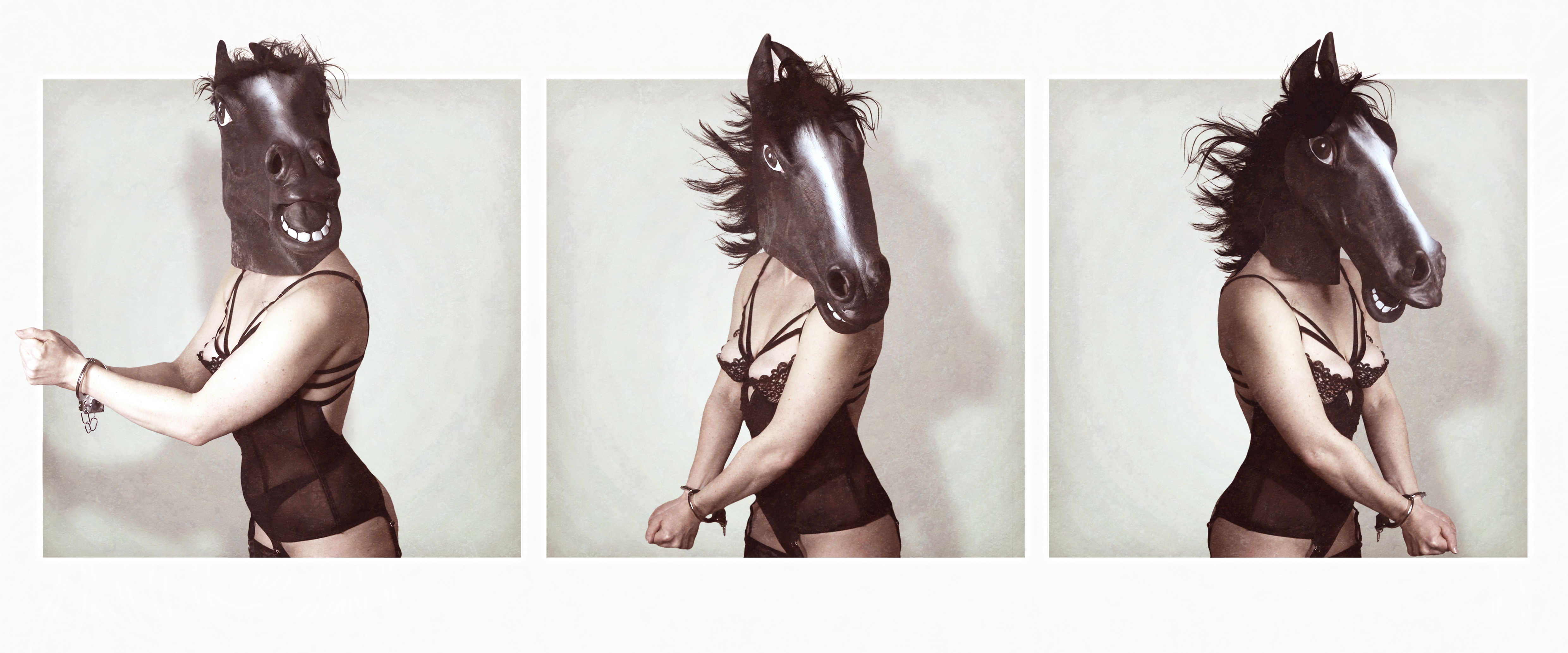Today’s guest blogger is writer and performer Stephanie Martin – she’s here to talk about sexuality, particularly women’s sexuality and the way it is policed. Check out her blog post below and if you’re in London, come along to her play Bridle, which is on at the Kings Head Theatre in Islington on 11th, 12th and 16th July.
Steph wanted me to point out that when she talks about ‘women’ and ‘female sexuality’, she means all women: not just cis women. I kind of hope that on this blog you can take that as read, but just in case, I’m going to state it up front. Her post also includes mention of some things that might be distressing including sexual assault and rape.
Bridle: challenging our misconceptions about female sexuality
“I’ll tell you what I’m going to do. I’m going to revenge-porn myself! I’ll film myself doing something disgusting and post it on some tacky website. Because then, you can’t shame me, because I’ve beaten you to it. Go on have a look if you want, I don’t mind, I mean, I don’t want to embarrass you, but you can have a look if you want, I think it’s fun! Isn’t it boring to feel shame, all the time?!”
I started writing because I was bored of being told the same thing over and over again: “Men are perverts / women* are victims”. The subtle and pervasive message which rewards women for keeping their knickers on. File it in the same reductive and restrictive cabinet as “make him wait”, “he’s being a typical bloke” and all those other delightful definitions furiously bandied about across Pizza Express tables and WhatsApp groups.
I want to expose reductive and stereotypical gender roles, rewrite these narratives and activate change.
Where do, those stereotypes come from? Can someone clever tell me? I’ve met just as many women/men/humans who disprove of the traditional patterns of gender roles as do abide by them. I think if we carry on repeating these ideas, replicating the characters and retelling the same stories, they will continue to self-fulfil their own prophecy.
I want to remove the ability to shame, to reduce, to silence, to embarrass, to diminish and to make victims of women in both sexual politics and the wider world.
Our ‘Bridle’ heroine couldn’t give a fuck! Or could she? She’s refusing to feel shamed! Or is she? I suppose it’s that conflict that makes the piece interesting. How far can we all climb and claw our way out of a veritable pit of heteronormative-take-your-husband’s-name-you’re-being-hysterical-world? She’s driven by wildness and freedom and yet ends up craving the comfort and security of a monogamous Sunday night hangover cuddle. Some of ‘Bridle’ is painful (abusive behaviour and BDSM explored side-by-side), some is celebratory (“can I tell you something, I’ve think I’ve fallen in love with my vagina! I used to think it was too much, hanging, outside, but now I think it’s fucking beautiful”) and lots of it is funny (satirising millennial lols: hen-parties, thigh-gaps, shitty jobs).
I think I end up writing about sex because it’s a heightened and intimate way of looking at people at their most vulnerable, at their most primal. I love people and what makes them tick and, without conscious intention on my part, the best way to explore people seemed to involve their sexuality and sexual politics. Lots of people seem a bit embarrassed about this (me included). Is it that sex is private? Or is that we’re ashamed, a hangover from Victorian moralising? The former is fine; the intimacy between two (or more) people is beautiful and intimate and to be respected. The latter is not fine. Shame about sexuality, behaviour and identity causes mental health issues and can be fatal. The statistics on transgender teen suicide are harrowing, for example. And I think it’s all linked.
Violence comes up a lot in my writing too, something that came as a surprise. The violence of ‘Bridle’ takes many forms: BDSM role-play; pit-of-the-stomach-paranoia that comes from feeling followed home from the tube; threatening abuse from a partner or family member; rape; the grope or thrust of a boss at a Christmas party. A subtle (and not so subtle) violent threat pervades much of our life as women and I had no idea how ever-present it was, until I started writing.
I started writing for the first time over the last year. It’s taken me a comparatively long time to get started (I’m 31) because as a woman I didn’t think I deserved to speak, loud and proud. Those who know me may well disagree with that – I don’t think many would describe me as shy in sharing my opinions. And I’m obnoxious once I’ve even had a sniff of booze (P.S sorry, everyone I’ve ever met, I do mean well, I promise, I just get over-excited). However, one only need consult the statistics on female vs male playwrights to see that there might be some truth to the feeling that I wasn’t entitled to write. Things are changing. There’s a tidal wave of change happening, or at least there is within in the liberal-echo-chamber-prosecco-socialist-bisexual-bubble in which I orbit.
I’d love for you all (it might be a bit of a tight squeeze) to see ‘Bridle’ and I’d love to talk about it with you. The piece provokes debate, thought and reappraisal of behaviour. At the centre of this debate to ‘unbridle’ there is a kernel of desire. A desire for an increased communication, kindness and freedom, both in sexual politics and beyond into the wide world, and that’s fucking fabulous.
Want to go and see it? Pick up tickets for Bridle here and follow @steph_martin_ and @clamour_theatre on Twitter.
